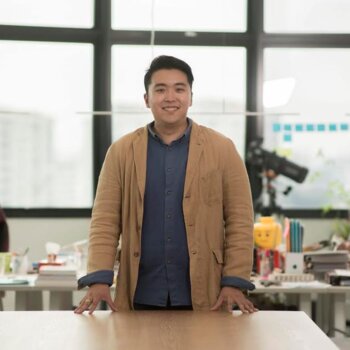Simon Lee lived and grew up in many different places throughout his life, a fact that he attributes to his flexibility in being an entrepreneur. Born in Kuwait, where he spent 4 years. Simon then moved and lived in the United States, the United Kingdom, Saudi Arabia, and finally settled in Korea. Simon began his professional career as an investor with SK Telecom, a major mobile operator in Korea. In 2007, Simon Lee founded Flyingcane, his first start up. Flyingcane was his first crowd-sourcing startup. In 2012, Simon founded Flitto. As part of the 26th Issue of the Feature of the Week, Simon speaks to the Asian Entrepreneur today, about his thoughts on his own entrepreneurial journey and the work he does with Flitto.
What is Flitto?
Flitto is a crowdsourcing translation platform that allows you to read any content in your native language or request translations as you need for voice, text, and image. You can also follow and read your favorite celebrities and brands’ social media feeds, find funny comics from around the world, or discover deals wherever you go, all in your native language.
Where did the idea for Flitto come from?
I spent half of my life in different countries where they use different languages. So I got interested in Languages. I realized many people are getting to know other languages and if we use their abilities we could easily break down the language barrier which has been there forever.
Tell us about the startup process.
Back in 2012 I worked as an Investor at SKT. I always wanted to run my own start up to see whether social translation would work or not. I applied for Accelerator program in London which was Springboard London, acquired by techstars and it became techstars London. All other co founders, Jin and Dan, are from SK.
How have you developed Flitto since startup?
Acceleration program helped me a lot. I could just focus on building platform with other co-founders and Springboard provided us mentors and all supports. We spent 13 weeks in London. Right after the program our beta service came out and it became one of the hottest application of the month right away from all different countries.
Did you find anything particularly difficult during the startup?
I spent 4 years in SKT. I could get annual salary and live stable life. Lot of friends were worried about me as best thing in asian culture is getting a stable job in big companies. But I wanted to run for my own dream so i didn’t really care about it.
What is one concept that has helped further your business?
If your mom can’t use it after teaching her for 10 mins, no one can use it.
Tell us about your industry?
Language barrier has been a problem that’s been around for thousands of years and many companies have tried to come up with a solution, such as machine translators or creating a platform that brings together professional translators. The translation market is valued at $33 billion with an annual growth of 12%.
Flitto, however, has taken a very unique approach to that of the other translation markets. While most translation platforms focus on being “professional,” flitto brings together the thousands and millions of people who know how to speak more than one language to our platform to translate content that they like in exchange for compensation. flitto uses game mechanics as well as cash compensation to reward its translators and also enables people who only speak one language to request translations or read content that they enjoy in their native language.
Could you share with us some industry insight?
If you come out with a great idea, share it with a lot of people around you. They won’t take an idea away from you but develop it and will give you many questions so that you can get a time to think of the answers before you come out with your product.
How have you managed to stay competitive in this industry?
We’re always working on something new: a new business idea, a new feature, and always thinking on how we can further improve our service. We always keep an eye on competitors or possible competitors, the trends that are going on in the IT industry, and always planning and operating in a fast manner, to remain competitive.
Simon Lee, co-founder of Flitto
Simon Lee lived and grew up in many different places throughout his life, a fact that he attributes to his flexibility in being an entrepreneur. Born in Kuwait, where he spent 4 years. Simon then moved and lived in the United States, the United Kingdom, Saudi Arabia, and finally settled in Korea. Simon began his professional career as an investor with SK Telecom, a major mobile operator in Korea. In 2007, Simon Lee founded Flyingcane, his first start up. Flyingcane was his first crowd-sourcing startup. In 2012, Simon founded Flitto. As part of the 26th Issue of the Feature of the Week, Simon speaks to the Asian Entrepreneur today, about his thoughts on his own entrepreneurial journey and the work he does with Flitto.
written by Mark Kuar, posted on 25th November 2013
(Pictured:Simon Lee, co-founder of Flitto)
What is Flitto?
Flitto is a crowdsourcing translation platform that allows you to read any content in your native language or request translations as you need for voice, text, and image. You can also follow and read your favorite celebrities and brands’ social media feeds, find funny comics from around the world, or discover deals wherever you go, all in your native language.
How have you developed Flitto since startup?
Acceleration program helped me a lot. I could just focus on building platform with other co-founders and Springboard provided us mentors and all supports. We spent 13 weeks in London. Right after the program our beta service came out and it became one of the hottest application of the month right away from all different countries.
Connect with Simon Lee and Flitto today:
Website:http://www.flitto.com/
Linkedin:http://kr.linkedin.com/pub/simon-lee/27/6ab/b31
Facebook:http://www.facebook.com/lee.simon.90


































